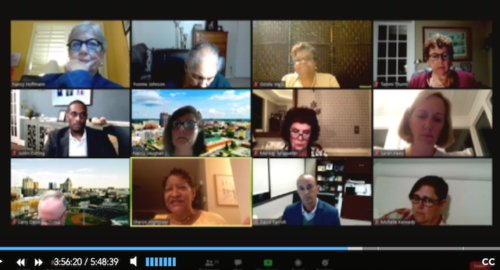The two principle governing bodies in Guilford County have traditionally met in similar fashion about a hundred yards apart from each other across the Phill G. McDonald Plaza.
The Guilford County Board of Commissioners for decades has met in the Commissioners Meeting Room of the Old Guilford County Court House on Thursdays and the Greensboro City Council in the Council Chamber at City Hall on Tuesdays. Both holding their meetings in compliance with the North Carolina open meetings law.
However, since Gov. Roy Cooper’s stay-at-home orders, and now Phase 2 of the reopening process, the two bodies have held extremely different public hearings.
The Guilford County commissioners have continued to meet in person in the Commissioners Meeting Room with various restrictions on the public attending.
The Greensboro City Council has been meeting virtually since April also with various restrictions on virtual participation by the public.
Guilford County Attorney Mark Payne has interpreted the law passed by the North Carolina Legislature in April allowing the limited public participation in a public hearing, but requiring the governmental body to allow the public to submit written comments for at least 24 hours after the public hearing, as meaning that the Board of Commissioners could not vote on the public hearing item until after the extended public comment period was closed.
Payne said, “The new statute has made what was simple a little bit more complicated.” He explained, “You can’t have a final vote until 24 hours after the public hearing ends.”
Greensboro City Attorney Chuck Watts has interpreted the same state statute differently. The interpretation by Watts is that as long as the public comment period is left open for 24 hours after the public hearing, the City Council can vote as soon as it closes the public hearing.
In fact at the June 19 City Council when a supporter of a rezoning request was unable to comment virtually during the meeting, Mayor Nancy Vaughan said that was not a problem because he could comment by email up to 24 hours after the public hearing and then the City Council voted to deny the zoning request.
But it raises the question, why would someone feel the need to comment after the vote has been taken. Vaughan was certainly correct as far as she went, but in fact a person can send an email to the City Council to comment on a vote a week, a month or a decade after the vote is taken under the normal procedure.


More nontransparency and dodging the public . City attorney should be ashamed.